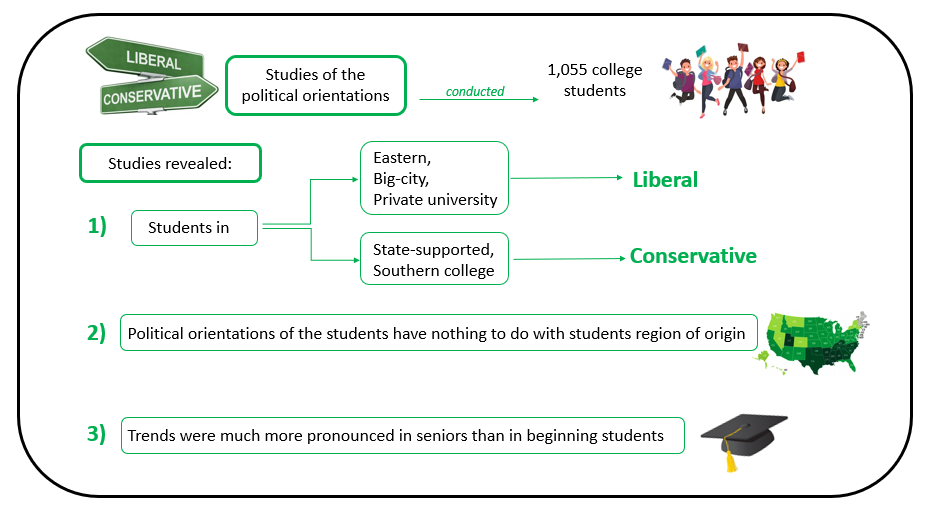Bunuel wrote:
Studies of the political orientations of 1,055 college students revealed that the plurality of students in an eastern, big-city, private university was liberal, whereas in a state-supported, southern college, the plurality was conservative. Orientations were independent of the student's region of origin, and the trends were much more pronounced in seniors than in beginning students.
Which of the following hypotheses is best supported by the observations stated above?
A. The political orientations of college students are more similar to the political orientations of their parents when the students start college than when the students are seniors.
B. The political orientations of college seniors depend significantly on experiences they have had while in college.
C. A college senior originally from the South is more likely to be politically conservative than is a college senior originally from the East.
D. Whether their college is state-supported or private is the determining factor in college students' political orientations.
E. College students tend to become more conservative politically as they become older and are confronted with pressures for financial success.
CR41661.01
Verbal Review 2020 NEW QUESTION
Analysis of the given prompt:Attachment:
 Argument analysis.PNG [ 89.35 KiB | Viewed 51938 times ]
Argument analysis.PNG [ 89.35 KiB | Viewed 51938 times ]
Question stem:Which of the following hypotheses is best supported by the observations stated above?
Question type:Inference (must be true)
Answer choice analysis:A. The political orientations of college students are more similar to the political orientations of their parents when the students start college than when the students are seniors.Analysis of (A): This choice compares political orientations of students with their parents. This orientations similar to parent's when students start college than when they are senior.
Analysis in terms of prompt: If we consider given informations in the given prompt. There is no supportive information about student's parent's political orientation or any comparison between.
A is incorrectB. The political orientations of college seniors depend significantly on experiences they have had while in college.Analysis of (B): We have some correlation here, senior student's PO (political orientation) depends on his/her experience in college, implying that by time spent in college student tends to change his/her point of view.
Analysis in terms of prompt: We do have some information about trends that that were much more pronounced in seniors than in beginning students. So difference between senior student and beginner student is on his/her experience gained during the college years. This information supported by the prompt, hence
B is correct.C. A college senior originally from the South is more likely to be politically conservative than is a college senior originally from the East.
Analysis of (C): We have comparison here, Senior students from South is more likely conservative than Senior students from East.
Analysis in terms of prompt: This is really tricky answer, if we were not VERY careful while reading the stimulus we could have chosen this answer as correct. This answer choice talks about senior students, conservative POs, and East and South originality. All this information exists in the passage but connected in a different way. We don't have comparison in the given stimulus, moreover it is clearly stated that POs of the students have nothing to do with students region of origin.
C is incorrect D. Whether their college is state-supported or private is the determining factor in college students' political orientations.
Analysis of (D): It states that determining factor about student's PO whether their college is state-supported or private.
Analysis in terms of prompt: So far in the prompt only determining factor of the student's PO is college experience not college type.
D is incorrectE. College students tend to become more conservative politically as they become older and are confronted with pressures for financial success.Analysis of (E): There is a tendention for students to become more conservative PO, because of pressure for financial success.
Analysis in terms of prompt: We don't have any information about why senior students choose to be conservative or liberal.
E is incorrectB is the answer



 45%
(medium)
45%
(medium)
 33%
(02:18)
wrong
33%
(02:18)
wrong  based on 6733
sessions
based on 6733
sessions








